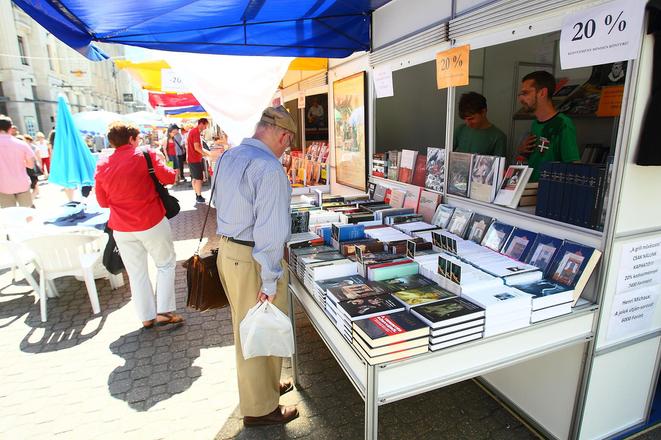While at the beginning of the e-books penetration on the Slovak market in 2011 publishing houses were slow to adapt and focused only to bestsellers, but things are changing.
“Almost every fiction book has its electronic twin,” Alexandra Petrášová from publishing house Slovart told The Slovak Spectator.
E-book growth is related to the increase in the number of readers using this platform. Although the share of e-book sales in comparison to sales of printed versions has been negligible in last three years, every year has brought growth, Petrášová added.
“The price of an e-book and the reader’s comfort play a role,” she said, “and the popularity of published titles is the same in printed and electronic formats.”
Jana Uherčíková from the publishing house Ikar pointed out that the market is growing more slowly than it has in past years.
“This year the market lacks a certain growth of sales,” Uherčíková told The Slovak Spectator.
Despite the lower sales, Ikar has tried in most cases to bring out e-books at the same time it offers a printed book unless the license agreements deem otherwise, according to Uherčíková.
Radovan Ščibrany from online bookstore Martinus.sk said that the number of available e-books in the Slovak and Czech language significantly expanded to current approximate of 1,000 titles and that hundreds of new ones appear each month.
“E-books have found their place in the book market and there is no doubt that they will remain with us,” Ščibrany told The Slovak Spectator.
On the contrary, Štefan Jakubik, managing director in iAdverti e-book publishing house, says that other publishers previously shared the view that e-books have a cannibalising impact to printed books. For publishing house Dixit, the co-publisher of iAdverti, the market is not broken up into electronic and print.
“In recent years, the thinking of authors and publishers has significantly shifted,” Jakubik said.
Popular genres
Whereas sales of e-books in particular genres represent quite a significant share of the entire book market turnover in the world, in sales account for just about 1 percent, according to Ikar.
Uherčíková says that as e-books are sold mostly in black and white publications including fiction, esoteric and mentor books, making them significantly less popular in text with photographic material, illustrations or difficult typography.
“Women’s novels, crime literature and thrillers have been sold well,” said Uherčíková, “and bestsellers in sales of printed books are the most requested also in electronic format.”
Slovart has published the majority of the titles of foreign fiction in electronic format including crime fiction, novels or classics. At the same time also all books of Slovak authors besides fairy tales for children have been published as an e-book, according to Petrášová.
“Quite a few books have been published in electronic format in the category of non-fiction so far,” she said.
For Martinus.sk, depending on the season e-books make up 3 to 5 percent of all book sales and the most popular are detective, crime fiction, romantic stories and motivational literature.
Ščibrany thinks that reader’s interest is influenced by the season, thus the most e-books are sold in the summer holiday and during the Christmas. It is possible also to give e-book as a gift, he said.
Different channels
According to Ščibrany, as opposed to printed books people can download an e-book instantaneously, e-books are cheaper, will never been sold out and are suitable for travel.
“E-books in combination with portable devices allow users to quick search for books, write notes and in the case of foreign literature also use the dictionary,” Ščibrany told The Slovak Spectator.
Ján Laš from Gorila bookstore said that in e-readers users can have a large number of books.
Customers can choose between two ways of reading e-books. Slovart in cooperation with Martinus.sk and other fixed sellers provide e-books via platform Dibuk based on special reader, and Ikar via mobile app Wooky available on smartphones and tablets.
The factors that most affect the interest of customers are popular genre and price, according to Uherčíková. The price of the printed book is made up of the cost of format, cover, number of pages, translation difficulty, editing and illustrations, cost of e-book is based on transfer of printing PDF format to e-book EPUB format. The price of each book is specific, she said.
“The price difference between printed and electronic book is usually at the level of 30 percent,” Uherčíková said.
Jakubik pointed out that e-books allow for creating multimedia books (audio – video) and location of the e-book to a worldwide market.
However, many people criticise the absence of smell or the feel of paper in the electronic format, according to Ščibrany.
Illegal copies
The current statutory of act on copyright does not allow sharing e-book without the author's permission and the subsequent download for personal purposes can be done from the copy that does not violate rights of the author. However, these rules are often contravened.
“This problem is alive in Slovakia,” Ščibrany said, “but lots of illegally shared publications are scanned books, not e-books.”
Petrášová added that portals on which illegal electronic documents for download are stored do not cooperate with publishers and writers.
“Sharing people have always found the new way to avoid rules intended to protect the system,” Petrášová said.
However, bookstore Martinus.sk contends the market may be able to eliminate such problems itself.
“The answer lies in the creation of high-quality legal alternatives,” Ščibrany said.
Another solution to ensure the systems for reading e-books is the Digital Rights Management system (DRM), which adds extra protection against illegal reproduction. In Slovakia it is used in the platform Dibuk but also by publishing house iAdverti that specializes in publishing books through Apple iBookstore portal.



 E=books are catching up on the market. (source: Petitpress)
E=books are catching up on the market. (source: Petitpress)